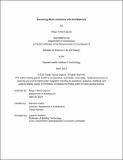| dc.contributor.advisor | Coelho, Marcelo | |
| dc.contributor.author | Yañez-Laguna, Diego | |
| dc.date.accessioned | 2024-10-16T17:44:23Z | |
| dc.date.available | 2024-10-16T17:44:23Z | |
| dc.date.issued | 2024-05 | |
| dc.date.submitted | 2024-10-10T15:17:34.974Z | |
| dc.identifier.uri | https://hdl.handle.net/1721.1/157348 | |
| dc.description.abstract | Despite the growing popularity of digital music instruments (DMIs) and relevant technological advances, accessibility and expressive potential remain significant challenges for musical interface designers. These issues stem from generic input-output mappings, sensor limitations, and a lack of physical connection between musicians and instruments. This thesis examines the benefits of incorporating soft materials into musical interfaces and why DMIs should be designed with musician-instrument relationships as a priority in order to enhance intuitiveness and expressiveness. This work culminates with design and analysis of a prototype that explores the potential of a foam user interface. Featuring pressure sensors embedded within foam blocks, the prototype encourages tactile interaction and gives the user nuanced control over various musical parameters. The modular design of the foam blocks allows for versatile configurations, enabling users to control multiple parameters simultaneously with simple, but responsive gestures. | |
| dc.publisher | Massachusetts Institute of Technology | |
| dc.rights | In Copyright - Educational Use Permitted | |
| dc.rights | Copyright retained by author(s) | |
| dc.rights.uri | https://rightsstatements.org/page/InC-EDU/1.0/ | |
| dc.title | Enhancing Music Interfaces with Soft Materials | |
| dc.type | Thesis | |
| dc.description.degree | S.B. | |
| dc.contributor.department | Massachusetts Institute of Technology. Department of Architecture | |
| mit.thesis.degree | Bachelor | |
| thesis.degree.name | Bachelor of Science in Art and Design | |
